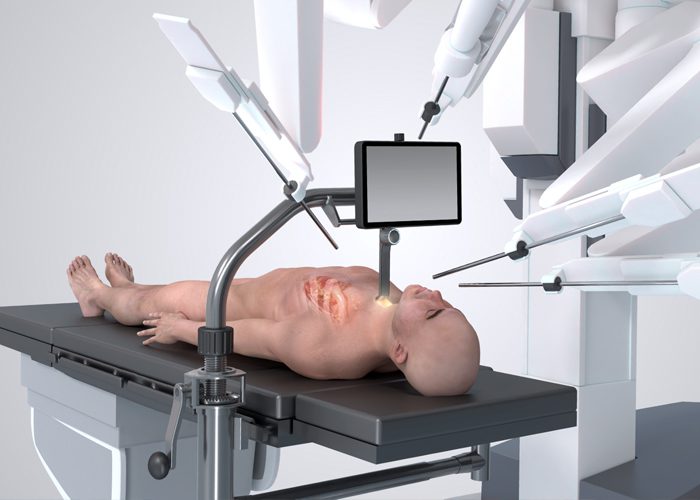A GLASGOW-based company has played a leading role in bringing the world’s first robotic aortic valve replacement through a tiny incision in the neck significantly closer to reality.
CardioPrecision – a specialist in less invasive treatment of structural heart disease – recently demonstrated a proof-of-concept AVATAR (Advanced Videoscopic Aortic valve surgery by Transcervical Approach using Robot-assistance) procedure in Chicago.
The procedure was successfully performed on a series of human cadavers, representing an important milestone in progressing towards clinical cases while also continuing to grow CardioPrecision’s Stateside presence.
The company – originally spun out of the NHS through InnoScot Health – utilised its CoreVista® Robot Enabling Platform® as well as the PercevalÔ Plus sutureless aortic heart valve from UK-based Corcym, a global medical device company focused on the structural heart area.
CardioPrecision’s chief medical officer and consultant cardiothoracic surgeon, Fraser Sutherland worked closely with Rocco Bilancia, consultant thoracic surgeon at Scotland’s Golden Jubilee University National Hospital, to introduce AVATAR to leading US robotic surgeons, Professor Husam Balkhy from the University of Chicago Medicine and Professor Danny Ramzy at Memorial Hermann of University of Texas Houston.
A Scottish Government investment of around £20 million in 10 surgical robots was announced in 2021 and further investment in robotics is anticipated nationwide.
Prof Rowan Parks, President of Royal College of Surgeons of Edinburgh and previous Chair of the RCSEd Robotic Taskforce said: “There is clearly vast potential here and it is exciting to see a Glasgow company helping to lead the way while putting Scotland firmly on the map for this pioneering approach.
“Robotic cardiac surgery is much less invasive than open-heart surgery. Fundamentally, it removes the necessity of the surgeon having to cut through the breastbone to open the chest, in turn removing many access-related complications.
“This could well be just the start of more complex surgeries with quick advances being made, benefitting both patient and surgeon.”
Dr Ying Sutherland, Chief Executive of CardioPrecision, added: “The main benefit of performing surgery via the transcervical approach – making a small incision in the neck – is that this is a very well circulated area that heals quickly with little or no pain. Most operations done through the neck are performed as day cases.
“Our CoreVista® Robot Enabling PlatformÔ therefore opens up the groundbreaking possibility of day case aortic valve surgery – a massive step forward in the field. We are tremendously grateful to have support from leading cardiothoracic surgeons in both Scotland and the USA.”
Fraser Sutherland added: “The first transcervical surgical aortic valve replacement was performed by Professor Otto Dapunt and myself using the CoreVista® platform some years ago. However, surgery has moved on since and the robot now provides surgeons with the technical dexterity needed to allow these complex operations to be performed by a majority of heart surgeons. It opens the door to widespread adoption of this technique which could ultimately benefit patients worldwide.
“Transcatheter aortic valve replacement (TAVR) is already performed as day case in some centres. However, not all patients are suitable for TAVR, and for those patients, the prospect of surgery can be quite daunting. Having seen the benefits of robotic surgery in other surgical specialities, I am confident that we will be able to deliver a much less invasive alternative to conventional surgery using these technologies.”
Chief Executive of Corcym, Dr Christian Mazzi, said: “We are delighted that Perceval PlusTM was selected for this seminal work and to have the opportunity of working with CardioPrecision and their CoreVista® Robot Enabling PlatformÔ. In combination with Perceval PlusTM, we believe this has resulted in a world-first and we look forward to achieving successful surgeries in the near future.”
Prof Danny Ramzy said: “Working closely with Dr Sutherland and Dr Bilancia has been transformative, allowing us to work through key steps of the procedure on cadavers that will ultimately ensure safe introduction into clinical practice. I look forward to seeing the first clinical cases performed.”
Prof Husam Balkhy said: “There is so much potential in robotic surgery and I’m very happy to be involved with this developing new procedure. As we have noted in the US, robotic-assisted surgery is increasingly being utilised across almost every surgical specialty. Cardiac surgery is a little slower in adoption but has many different proven applications in robotics as we have shown at UChicago. I am confident that this new approach will add to the possibilities for cardiac surgeons to offer patients the least invasive option using robotics combined with other innovative platforms such as CoreVista®.
“As with the introduction of any new surgical procedure, patient safety remains paramount, so it is important that it is tested rigorously at all stages before actual implementation, but we are excited by the possibilities.”
